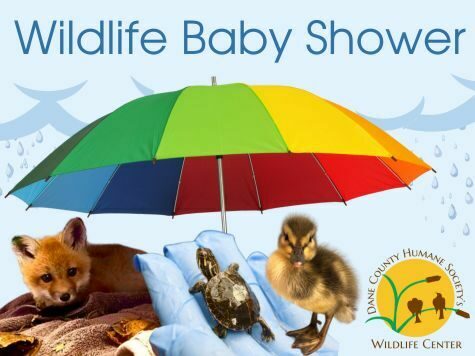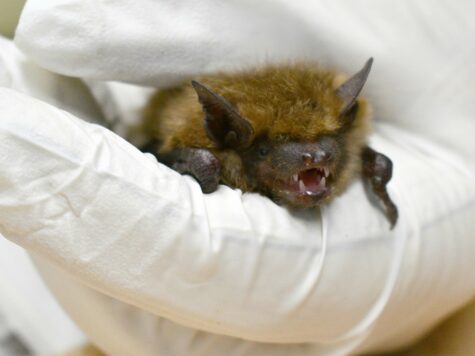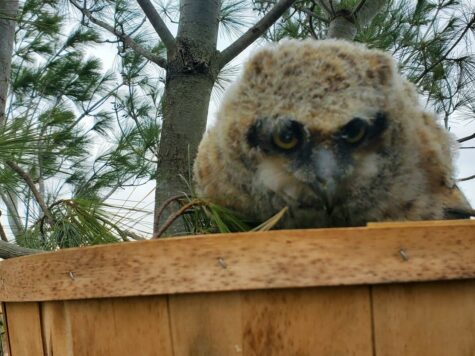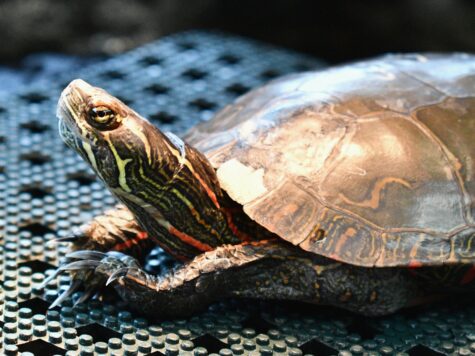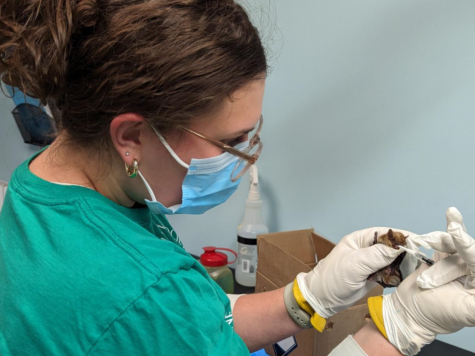As you peruse adoptable cats on DCHS’s website, you may see on a cat’s medical history that they tested positive for feline immunodeficiency virus (FIV). This disease can sound scary, but we’d like to share some information to the contrary by telling the story of a very beloved cat named Stan.
In December 2016, Mindy accompanied her mother to Lakeland Animal Shelter in Delavan so her mother could meet a dog. Mindy’s orange tabby Tigger had recently passed away, and she decided to look at the available cats while she waited.
She entered a room of FIV-positive cats. “Stan was sitting on a cat tree. I walked up to him to see him and he sat on his butt and put his arms out and literally gave me a cat hug,” recalls Mindy. “I knew right then and there that I was going to adopt him. It was love at first sight.”
“I met Stan on December 5th and filled out the adoption application the same day.” But, Mindy notes, “I was not able to adopt him and take him home until December 9th, because all of the volunteers and staff wanted to say bye to him before he went home with me.”
You see, Stan is a very friendly, easy-going cat who befriends everyone – both humans and dogs. He was at that shelter for eight months before Mindy came into his life.
As Mindy waited to be able to take Stan home, she began doing some research about FIV-positive cats. Since adopting him, she’s done a lot more research.
Now, Mindy, who began working at DCHS in 2017, has become an advocate for FIV-positive cats. In fact, she and Stan frequently share their experience and knowledge of FIV with campers at DCHS’s Camp Pawprint.
Let’s jump on that education bandwagon:

What is FIV?
FIV is a viral infection that affects a cat’s immune system, making them more susceptible to other infections. It can only be transmitted to another cat through a deep bite wound, fighting, or mating, but it is only a risk to cats. The infection cannot be transmitted to people or dogs.
While there is no cure for FIV, infected cats commonly live the same average life span as an uninfected cat. (described below). In fact, FIV-positive cats can go years without showing signs of illness. There are a few basic precautions pet parents can take to support a long, comfortable life for their FIV-positive cats.
To help prevent the spread of FIV, cats should be kept indoors. Cats also should be spayed or neutered to reduce transmission risk through mating, reduce the cat’s desire to roam, and decrease aggressive behaviors that could lead to fighting and bite wounds.
Does DCHS test every cat for FIV?
DCHS does not test every cat for FIV because the disease rate is low among locally owned and free-roaming cat populations – only about 2.5 to 5 percent of felines in North America have FIV.
Also, the tests can give false negatives or positives. The test doesn’t actually check for the virus; rather, it identifies whether antibodies to the virus are present. It takes between 2 and 6 months to develop enough antibodies to be detected by the test, so a test on a newly infected cat could return a false negative.
If a member of the public wants the cat they are hoping to adopt to be tested for FIV, DCHS can run the test for $30.

What are the symptoms of FIV?
Some FIV-positive cats may not exhibit symptoms for years, while others may have their health progressively deteriorate or suffer repeated bouts of secondary infections.
Cornell University College of Veterinary Medicine’s article on FIV says, “Most illnesses related to FIV are (sic) not from the virus itself, but from these secondary infections or problems with the immune system. Cats may develop chronic or recurrent infections of the skin, eyes, urinary tract, or upper respiratory tract.”
In addition, infected cats can suffer from inflammation of the gums, severe dental disease known as gingivostomatitis, and they are significantly more likely to develop cancer and immune-mediated blood disorders, according to the university.
Like many cats, Stan had a few bad teeth extracted over the years. At one point, his gums began reacting to the enamel on his teeth, causing them to be swollen and irritated, likely due to his FIV-positive status. This led to a full-mouth extraction.
But Stan eats his dry food just fine (he doesn’t like wet). “He just swallows his food whole,” Mindy explains.
“He is also more prone to skin infections and upper respiratory infections because his immune system is weak,” says Mindy. “But he hasn’t had either of those for a few years now.”

How to care for a FIV-positive cat
According to Cornell University, FIV-positive cats should have wellness visits at least every six months with a veterinarian. During these visits, the veterinarian will perform a detailed physical exam while giving special attention to the cat’s gums, eyes, skin, and lymph nodes. “Weight will be measured accurately and recorded, because weight loss is often the first sign of deterioration. A complete blood count, serum biochemical analysis, and a urine analysis should be performed annually,” the university suggests.
“It was recommended by my veterinarian that a cat with FIV go for bi-annual vet visits,” Mindy says. “He has his labs drawn every year so we can keep a baseline for him that way we have something to compare his labs to when/if his health ever does decline.”
Stan has not had any issues since 2020. “Stan is not on any medications. The only thing he has special is his prescription diet food, which his vet does not believe is FIV-related. She said some cats just have a slower metabolism,” Mindy says.
Can FIV-positive cats cohabitate with FIV-negative cats?
We suggest potential adopters chat with their veterinarian and do their research about FIV before adopting a FIV-positive cat.
A 2014 study from Purdue University’s School of Veterinary Medicine showed that FIV-positive cats living with FIV-negative cats for a period of years did not spread the disease despite having unrestricted access to one another during which they engaged in mutual grooming, minor episodes of aggression, and shared food and water dishes, litterboxes, and bedding.
“In a nutshell, FIV-positive cats are slightly higher maintenance so people should be aware that they may have to go to the vet more often for preventative care,” says Mindy, “but they should know that just because the cat is more susceptible to getting ill easier than a cat with an immune system working at 100 percent, it doesn’t necessarily mean that it will get sick. Lots of cats with FIV live a long happy life without running into issues with their health.”
Stan celebrated his 8th birthday in May 2023, and health-wise, he’s doing well, despite being a little overweight.
“I would not do anything differently with Stan. If I had a crystal ball back then and could see seven years into the future, I would still adopt him all over again,” Mindy says. “He is the best cat ever!”













